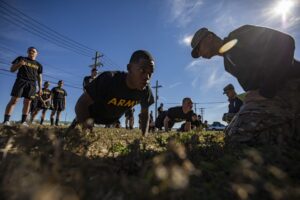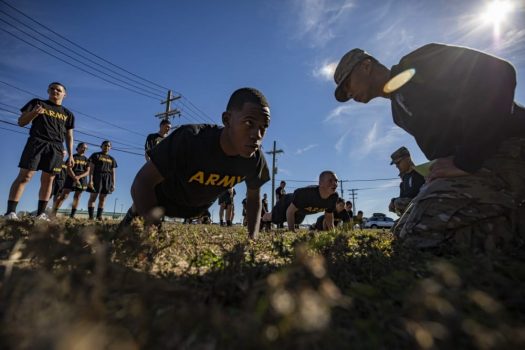Have you ever wished that you could go back in time? I think we all have, at least occasionally. Unfortunately (or fortunately), nobody’s invented that magic machine just yet.
However, while we can’t go back in time, we can benefit from the advice of those who have “gone before” us and traveled paths similar to those we are likely to travel ourselves. Recently a conversation on an online military discussion board caught my eye. It was a discussion among newly enlisted service members asking for financial advice (“What do you wish you’d known? What would you have done differently?”) – from those who had “been there and done that.”

New Jersey’s Recruit Sustainment Program prepares future Soldiers. Photo by Master Sgt. Matt Hecht, DVIDShub.net
While not all advice seemed completely sound (for instance, I saw someone suggesting investing in Bitcoin), there were some good words of wisdom that I thought seemed worth distilling here. Here’s a brief summary.
Don’t buy a new car
This came up time and again, maybe because it’s such a common mistake. Advice was instead to buy a sensible, “boring” used car of a reliable make. Many suggested buying a car at all can be avoided when living on base.
Beware of alcohol, cigarettes, and a “party” lifestyle
Almost nothing costs more and leaves you less to show for it than spending money on alcohol, cigarettes, or worse. While we all want to enjoy time with friends, a party lifestyle is an expensive and dangerous way to burn through cash.
Don’t let peer pressure or the feeling of a flush bank account talk you into buying “toys”
Many talked about the danger of being tempted into buying into expensive “toys” like gaming systems, jewelry, sports equipment, motorcycles, and boats. This may be a particular danger for young recruits with no dependents who find they don’t seem to have a lot of expenses.
Set up TSP right away, and contribute 5% as soon as possible
“Everyone wishes they’d set up their TSP earlier” is what I read, and that sounds about right. It’s best that new recruits not “get used to” having the money that should be going to TSP, so setting up from the get-go is a very smart plan. You never feel the loss if you’ve never had that money in your account! As soon as possible, get the maximum match by going to the full 5%.
Learn how to cook
This simple piece of advice applies to every young person starting on his or her own! Although those living on base may have meals provided, in the end, we all need to know how to cook our own meals rather than relying on take out, fast food, or frozen dinners—expensive, and bad for our health.
Consider getting a roommate
If single and unattached and not living on base, this can be an excellent way to pocket some BAH.
Get the right credit card—but don’t overuse it
The protections of the SCRA (waived fees, low interest rates) mean that there are some very good options out there for credit cards for service members (in addition to service-specific cards). Getting off on the right foot here is a nice start, but young service members should use their new card wisely and plan to make payments in full each month.
Put pay raises to work
Pay raises should come pretty quickly in the first few years; rather than spending them, experienced service members suggest using them wisely by immediately putting them towards savings goals and/or eliminating debt.
Track expenses and make a budget
It gets said again and again…because it’s excellent advice! There are lots of good online tools and apps these days to help with this.
Be cautious about jumping into marriage
While it may not be what the young and in love want to hear, many message board users advised taking it slow when it comes to romance. Marriage is expensive, and divorce is even more so. Statistics show that those who marry young are more likely to split.
Of course, it’s often much easier to dole out advice as an armchair quarterback than it is to actually take it in the here and now. Still, I thought this perspective could be very helpful to new service members as well as to those who work with them.















